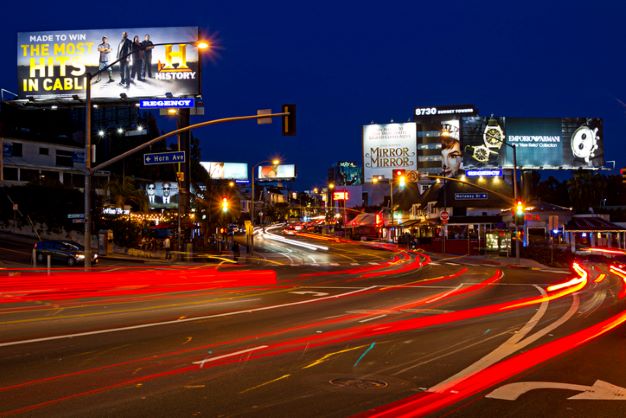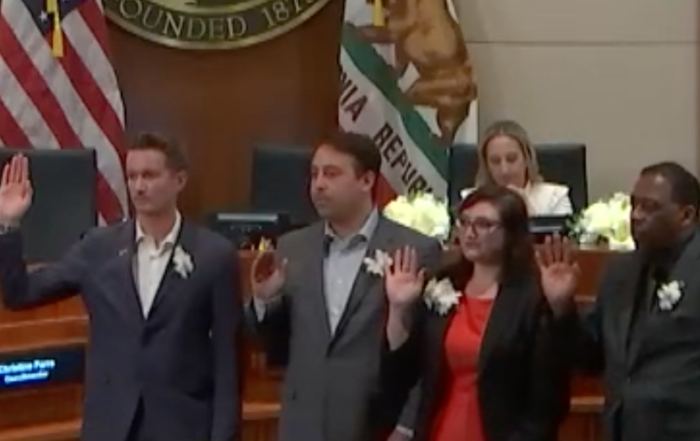Recently, a joint subcommittee comprised of members from the city’s Public Safety Commission, Women’s Advisory Board, LGBTQ+ Advisory Board, and Transgender Advisory Board came together to suggest a special session to address concerns over nighttime safety in West Hollywood. On Tuesday evening, the city council convened a study session with representatives of these boards and commissions.
West Hollywood’s Director of Community Safety, Danny Rivas, opened the evening by providing the city council and participating commissioners with some context for the importance of the study session. He reminded participants and the public that as pandemic restrictions eased, life reopened for some two hundred entertainment venues in the city. But it wasn’t too long, reported Rivas, before residents were telling media outlets that they felt their drinks were spiked with drugs, which was followed by investigations by the West Hollywood Sheriff’s station. The city itself put out press releases warning the public about the danger and encouraged victims to report their incidents to the Sheriff’s deputies.
In November of 2021, the city went so far as to pass an ordinance requiring bartenders and servers to be trained on bystander intervention through a partnership with the UCLA Rape Treatment Center. The training manual developed for them can even be downloaded from the city’s Website. In addition, special test cards have been developed that the city and sheriff’s department have begun to distribute so that patrons can tell whether their drinks have been contaminated with date rape drugs. When the cards are inserted in drinks, they turn blue if they’ve been contaminated.
Jackie Steele, a public safety commissioner, voiced support to increase victim advocacy efforts in the wake of these incidents.
“The thing that I still worry about,” said public safety commission vice chair Kerri Balbone, “The process that we’ve heard the people who believe that they’ve actually been drugged have to go through is exhaustive. They’re left without any advocacy and potentially the time that ticks by leads to the fact that we can’t really find out what happened to that person.”
Women’s Advisory Board Member Sajji Lazarus wanted to hear more about what’s being done on the preventative side of the issue. She said, “I want to know how we’re measuring the effectiveness of any of these trainings, and how we can be looking for solutions to prevent these things from happening in the first place that aren’t going to be detrimental to these businesses and community at large.”
Her colleague, Women’s Advisory Board Chair Keely Field, who was herself victimized, wants test cards for drinks as readily available as free condoms that establishments make available. She made the point that having the cards readily available will provide instant results that can allow a patron and bar manager to look at security footage close to the time of the incident rather than having to scan a larger block of footage hours later.
Members of the public weighed in with a variety of experiences and viewpoints. One young man, J.D., who was physically attacked just a week ago, said, via Zoom, that he’s having to chase down security footage on his own because the sheriff’s office doesn’t have the bandwidth to help him. Another gentleman, Wes, who identified as an advocate for victims of violence and human trafficking, Zoomed in to say that men face a “double stigma” and their incidents are under-reported because many men don’t want to admit they weren’t, essentially, strong enough to overcome their attackers. He additionally pleaded with the council, commissioners, and board members not to forget to target their marketing on this issue to men.
Catherine Eng, a Business Licensing Commissioner present in chambers, recommended to the body that a Block-By-Block security ambassador be assigned to each venue selling alcohol in order to keep a watchful eye.
Shane Nash was also on hand to bravely and passionately speak of being drugged and raped, having to go to the ER, and his humiliation on the part of the Sheriff’s department. He was first told by a deputy that he didn’t need a rape kit, and was then made to wait four days to shower before finally receiving this service. He has heard nothing but excuses from the Sheriff’s department in the eight months since, as they have yet to bring a suspect in for questioning despite his claim that through talks with other victims he knows who attacked him.
Councilmember John Erickson and Mayor Pro Tem Sepi Shyne inquired with Sheriff’s Sergeant Michael Yost about the process and timeline by which security footage is obtained. Shyne also expressed the need to reach out to hospitality businesses regarding how long they save their security footage, saying that if a business only keeps its footage for 72 hours, for example, then a sheriff’s deputy needs to act quickly on a victim’s behalf.
“When we’re talking about evidence, it’s crucial that that happens within a certain time,” said Shyne. “It’s that would be helpful for victims; be helpful for preserving evidence; and will be good for your department,” she continued.
Councilmember Lindsey Horvath, currently a candidate for county supervisor, asked Mr. Rivas, “Are these incidents being reported or discussed in any way to the Business Licensing Commission, to track if there are problematic businesses that have repeat reports of these incidents?”
Rivas stated that the Business Licensing Commission themselves asked for, “Continued, ongoing reports of the types of incidents and the volume being reported.” With regard to cannabis consumption lounges, which have yet to open, Rivas said the licensing period will be a good time to meet with these businesses and ask them to be aware of over-consumption.
Mayor Lauren Meister, upon learning from Rivas that security cameras aren’t technically required of bars or the forthcoming cannabis lounges, suggested that the city should probably put some requirements on the books that require this of hospitality businesses. She also feels that it isn’t asking too much to require these businesses to keep security footage for a particular length of time.
During an open discussion period that followed council comments, Commissioner Balbone asked for the number of incidents of sexual assaults that have taken place in West Hollywood, and how many have resulted in closed cases being prosecuted. Her colleague, Commissioner Steele, cited a few minutes later a report showing that, she explained, “Between 2016 and 2021, there were 30 sexual assaults tied to drink-spiking incidents in the city of West Hollywood, and only three of those have cases filed with the D.A.” She later added, “53 percent of the sexual assaults occurred with one owned establishment,” though she didn’t want to call it out by name.
Several questions went unanswered for now, with Sergeant York saying he needed to get back to participants on training questions. City Manager David Wilson also said he would work to obtain answers to several questions and deliver them to council meetings as well as the Public Safety Commission in September.
Mayor Meister also assured participants this issue, “Will be coming back, and coming back again.”
Photo by Merkuri2 on iStockphoto
Correction: A previous version of this story identified the city manager as David White, who is the City Manager of Santa Monica (where the author lives).
Stay informed. Sign up for The Westside Voice Newsletter
By clicking submit, you agree to share your email address with Westside Voice. We do not sell or share your information with anyone.








